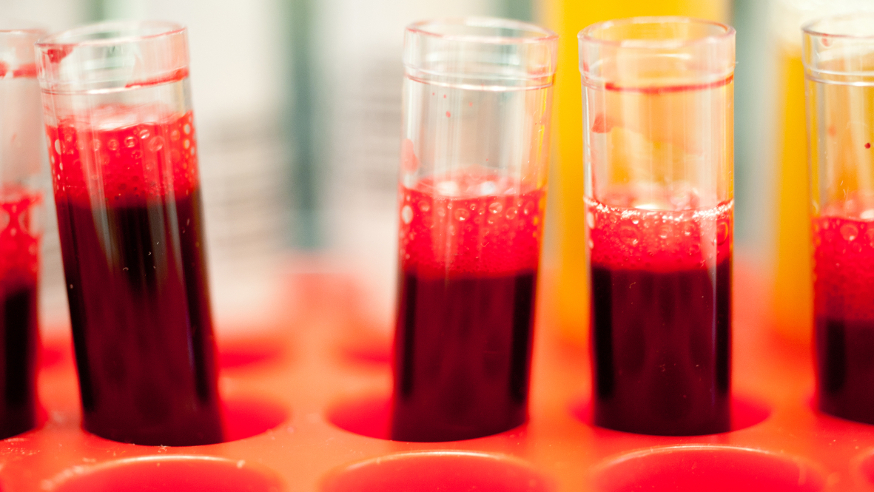
Image: Blood samples in tubes.
Doctors could predict whether a man’s prostate cancer will be aggressive at the point of diagnosis – giving him the best targeted treatment quickly before it spreads – thanks to a new £1.5 million research project harnessing artificial intelligence and cutting-edge genetic analysis.
A multidisciplinary team across the UK, led by Professor Ros Eeles at The Institute of Cancer Research, London, has collected data from blood and tumour samples belonging to 2,000 men with prostate cancer across nine countries, and will analyse them to look for unique genetic signatures in the samples from men whose cancer is aggressive. The project is funded by Prostate Cancer UK.
Providing treatments before cancer spreads
It’s often hard for doctors to know which men will be affected by aggressive prostate cancers. This tool will give doctors the power to give these men targeted, tailor-made treatments before it begins to spread – ensuring that the length and quality of these men’s lives isn’t left to chance.
Professor Eeles and her colleagues will also study samples from men who have undergone radiotherapy and will develop a similar AI model to predict which men’s prostate cancer is likely to come back after treatment – allowing clinicians to tailor therapies and monitor these men closely to prevent it.
The researchers will test the accuracy of these models on samples from men who have been diagnosed with prostate cancer and are on active surveillance, as well as samples from men who have taken part in STAMPEDE, a clinical trial that is looking for the best ways to treat men with newly diagnosed advanced prostate cancer.
Understanding which DNA changes are linked to more aggressive cancers
Professor Ros Eeles, Professor of Oncogenetics at The Institute of Cancer Research, London, and Consultant in Clinical Oncology and Cancer Genetics at The Royal Marsden NHS Foundation Trust, said:
“We have a huge amount of genetic data from thousands of men who come from diverse backgrounds and ethnicities around the world. In the next stage of our work, we’re going to use advanced artificial intelligence to look at this data and identify patterns that will unlock answers to which specific DNA changes are linked to more aggressive prostate cancers that spread quickly.
“Armed with this knowledge, we’ll develop a model that can predict whether a man’s prostate cancer is going to be aggressive based on a simple blood sample. This will help clinicians overcome significant challenges and could revolutionise the way prostate cancer is diagnosed, treated, and managed.”
Stephen Fry was diagnosed with prostate cancer in 2018, after seeing his GP about something unrelated.
Stephen Fry said:
"My prostate cancer diagnosis came out of the blue. I was getting a flu jab, and my doctor suggested we run a full check-up; then after a PSA blood test and an MRI scan, I got the unwelcome news nobody wants. Luckily, despite my cancer being very aggressive, they found it early enough to get rid of it, and that was essentially down to a chance conversation with my GP.
"With prostate cancer, I now know you can't leave anything to chance. It's reassuring to hear about scientific research that will give men more certainty of a long life, instead of guessing or hoping - especially for men with aggressive cancer like mine.
"I urge every man to find out your risk of getting prostate cancer today. Don't leave it to luck!"
‘When it comes to prostate cancer, we can’t leave anything to chance’
Dr Matthew Hobbs, Director of Research at Prostate Cancer UK, said:
“When a man gets the horrible – and often unexpected – news he has prostate cancer, it’s important that he gets the right action plan for his specific cancer right away.
“Every cancer behaves differently and, at the moment, it’s not easy for a doctor to predict if a man’s disease is going to spread quickly and aggressively around the body. We’ve invested in this research so that eventually men and their doctors will be equipped with more of the information they need in order to find and treat the deadliest cancers as quickly as possible.
“When it comes to prostate cancer, we cannot leave anything to chance. We need major research projects like this to give the 1 in 8 men who will get the disease more certainty that they’ll be diagnosed earlier, get the best personalised treatments, and have longer, healthier lives.
“We designed this funding scheme very deliberately to fund large grants to make the big leaps forward men need, and we’re delighted with the quality of proposals we have received and funded. None of it would be possible though without Prostate Cancer UK’s generous supporters who have donated and joined our mission to build a world where no man dies of prostate cancer.”
As well as The Institute of Cancer Research, London (ICR), the research team comprises world-leading experts from the University of East Anglia, the University of Manchester, the University of Oxford, and the University of Cambridge.
Prostate Cancer UK is supporting Prof Eeles’ research with £1,499,998 from its Transformational Impact Awards.